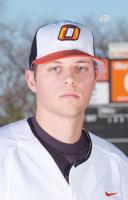 Go check out the National Sports and Entertainment Law Society’s blog for a post by Tassos Kaburakis, Ph. D., an Assistant Professor of Sport Law and Sport Management and Director of the Sport Management Graduate Program at Southern Illinois University Edwardsville. He has a very in-depth response to the recent Opinion and Judgment Entry released by Judge Tygh M. Tone in the Andy Oliver case. While I definitely disagree with a lot of what Kaburakis mentions, his arguments are well-grounded and make me second guess a lot of my original thoughts on the ruling. I believe that it is ludicrous that the NCAA should be allowed to limit an attorney’s advising role between student-athletes and scouts, but Kaburakis points out some other flaws in the judgment that I overlooked after my first read. One of his closing statement’s is,
Go check out the National Sports and Entertainment Law Society’s blog for a post by Tassos Kaburakis, Ph. D., an Assistant Professor of Sport Law and Sport Management and Director of the Sport Management Graduate Program at Southern Illinois University Edwardsville. He has a very in-depth response to the recent Opinion and Judgment Entry released by Judge Tygh M. Tone in the Andy Oliver case. While I definitely disagree with a lot of what Kaburakis mentions, his arguments are well-grounded and make me second guess a lot of my original thoughts on the ruling. I believe that it is ludicrous that the NCAA should be allowed to limit an attorney’s advising role between student-athletes and scouts, but Kaburakis points out some other flaws in the judgment that I overlooked after my first read. One of his closing statement’s is,
But decisions such as these, and commentary that wishes to abolish the system without working through the system to promote prudent reform for all constituents involved are not offering anything of value.
Thoughts?
2 replies on “A Provocative Response To The Andy Oliver Ruling”
It is interesting that Kaburakis only points to the potential harm being done to the schools while there is real harm being done to the student athletes. In reality, the NCAA rules about amateurism promote an ideal. The rules relating to what an attorney can and get do for his client are a matter of legal rights. Maybe it’s the lawyer in me – but legal rights should always trump an ideal of a business association.
His craziest contention is that schools would repeatedly recruit and play athletes who are ineligible. The NCAA deals very harshly with repeat offenders. This does lead to one of his better questions though – how can a school realistically play a player that is the subject of an investigation and may be ineligible to play when the penalties for playing an ineligible player will cost the school so much? Honestly, the answer is pretty simple – due process requires that people be considered innocent until proven guilty. The same penalty will apply regardless of whether the school had reasonable suspicion before or not – so it is better to play the player. Additionally, it is within the NCAA’s powers to modify the punishment depending upon the severity of the incident and whether it is a result of systematic failure or an accidental transgression.
As for his final statement – it is not up for a judge to provide or promote a new system. That would be legislating from the bench. He is merely required to rule on the case before him and state his reasoning therefore.
Perhaps the simplest thing to do would be to change the definition of what it means to be an amateur so that student athletes lives aren’t ruined so easily by a mistake. For example, to change the definition so that a player doesn’t become professional the second he/she signs a professional contract, but the second he/she plays as a professional. (I concede that there would probably have to be some sort of time limit on the former so that players don’t sign professional contracts while they are freshmen – or even in the middle of a season. The NCAA can create a window such as before college and during the summer – the player may sign and/or negotiate a professional contract. If it is still in place when sport starts, then they lose their eligibility.)
[…] https://sportsagentblog.com/2009/02/16/a-provocative-response-to-the-andy-oliver-ruling/ […]